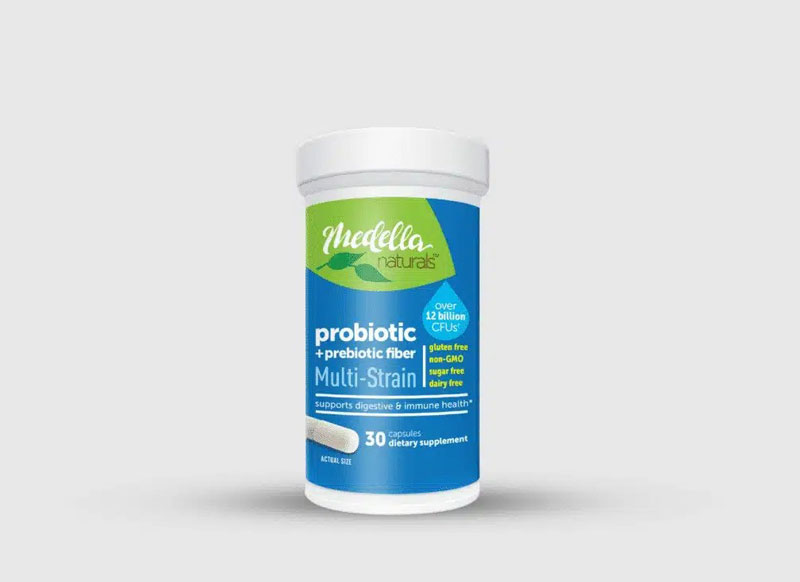The mighty microbes living in our gut are essential to digestion, immunity, and overall health. Among these heroes of wellness are probioticsthe rockstars of gut flora. Probiotics are live bacteria and yeasts that provide numerous health benefits for the body when consumed in adequate amounts. They promote healthy gut bacteria balance by keeping “good” and “bad” bacteria in check.
This post is designed to help you comprehend the world of probiotics; implementing them into your daily regimen can be a game changer for your digestive health. Let’s delve right into the microscopic universe inside us!
What Are Probiotics?
Probiotics are a hot topic in health and wellness, but what exactly are they? Simply put, probiotics are live bacteria and yeasts that are good for your digestive system. They play a crucial role in keeping your gut healthy by balancing the “good” and “bad” bacteria. This balance is vital for optimal digestion and overall well-being.
If we delve deeper into the science behind probiotics, we find that these beneficial microorganisms aid in breaking down food and extracting more nutrition from it. They also prevent the growth of harmful microbes in the gut, maintaining a healthy gut flora.
How Do Probiotics Benefit Your Gut Health?
The good bacteria in probiotics act as stewards of this ecosystem, promoting harmony and balance. They break down substances the human body cannot naturally digest, like lactose or certain viruses and bacteria. Different types of probiotics have varying effects on digestion, potentially reducing gas production and improving overall gut health.
Natural Source Of Probiotics
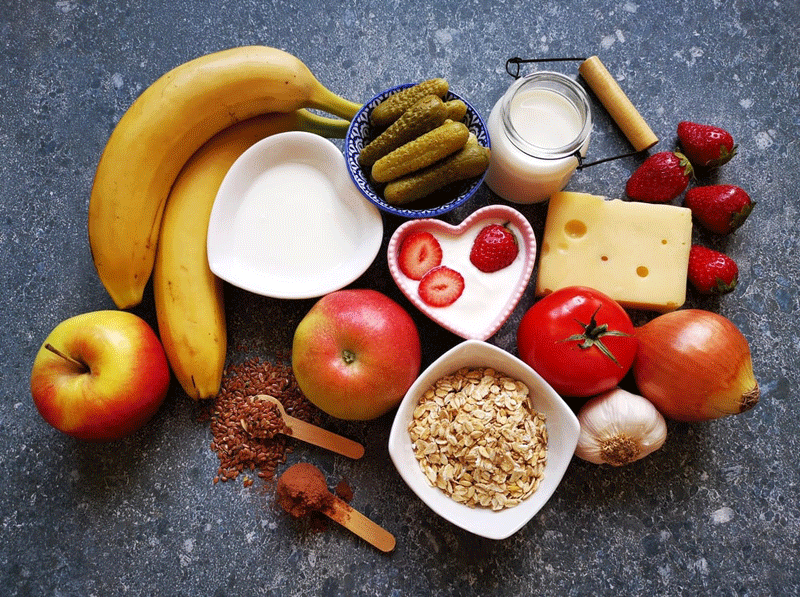
Probiotics can be found naturally in some fermented foods, which help improve digestion, boost immune function, reduce inflammation, and potentially even support mental health. These best food with probiotics include:
- Yogurt
- Cheese
- Sauerkraut and Kimchi
- Kefir
- Raw sauerkraut
- Tempeh
- Miso
- Kombucha
- Natto
- Lacto-fermented vegetables, such as pickles
Types of Probiotics
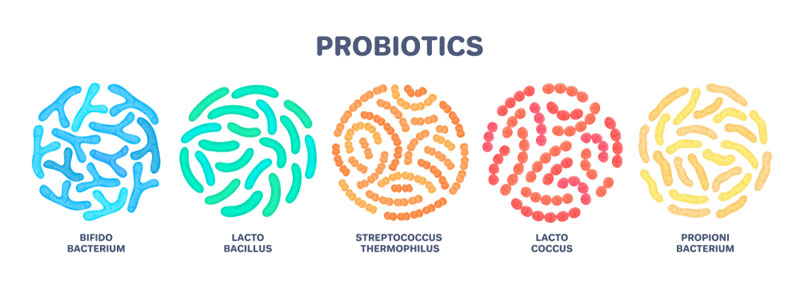
The most frequently encountered probiotics belong to two primary genera, Bifidobacteria and Lactobacillus, and these are the most extensively researched within the field. Other bacteria may also be used as probiotics, and so may yeasts such as Saccharomyces boulardii. The most common probiotics are:
Bifidobacteria
This bacterial genus is widely utilized in various food products and supplements. Bifidobacteria are believed to:
- Bolster the immune system
- Inhibit the proliferation of harmful bacteria in the intestinal tract
- Assist in the breakdown of lactose into beneficial nutrients for the body’s use
Lactobacillus
Lactobacillus bacteria produce lactase, the enzyme crucial for lactose digestion. Additionally, these bacteria generate lactic acid, which plays multiple roles, including:
- Regulating the population of detrimental bacteria
- Serving as a source of energy for muscles
- Enhancing the absorption of essential minerals
Lactobacillus bacteria naturally inhabit regions such as the oral cavity, small intestine, and vaginal environment.
Saccharomyces Boulardii
Unlike other probiotics, which are bacteria, Saccharomyces boulardii is a beneficial yeast that can significantly promote digestive wellness.
- Saccharomyces boulardii effectively manages diarrhea.
- Restoring the balance of good bacteria in the gut
- Reducing inflammation
Potential Health Benefits of Probiotics
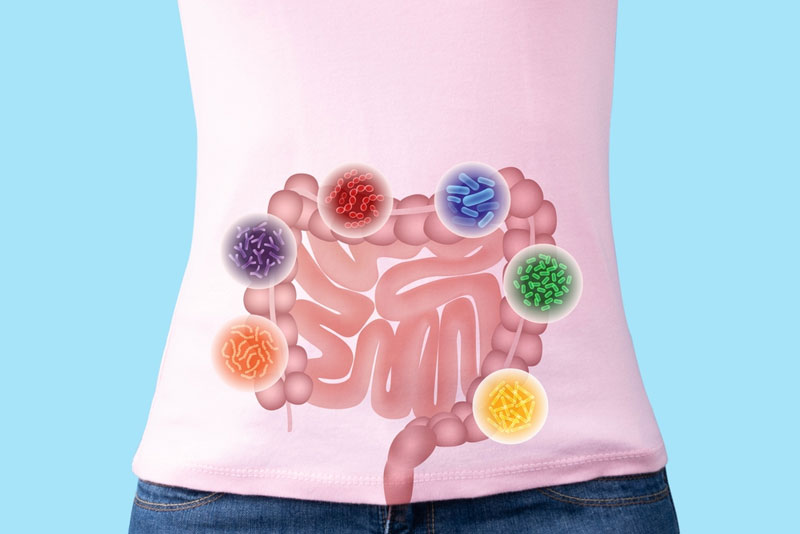
Probiotics benefit our health, primarily the digestive system. Beyond this primary function, research has been delving deeper into the various benefits they offer. Here are some of the potential health benefits of probiotics:
Improved Digestive Health
Probiotics can balance out the harmful bacteria, ensuring that your gut has more of the beneficial kind. This balance can alleviate symptoms of irritable bowel syndrome, inflammatory bowel disease, and diarrhea caused by antibiotics or infections.
Reduced Cancer Risk
Some studies have suggested that probiotics help reduce the chances of cancer-causing substances in the body. Improving gut health and maintaining a balanced microflora can enhance the body’s natural defense against potential carcinogens.
Prevention of Allergies and Digestive Disorders
Probiotics aid in developing and strengthening newborns’ immune systems, reducing the risk of allergies, eczema, and certain digestive disorders later in life.
Better Oral Health
Believe it or not, our mouth also hosts a myriad of bacteria, some of which can lead to tooth decay and gum disease. Probiotics, especially the strain Streptococcus salivarius, have shown promise in reducing harmful bacteria in the mouth, potentially leading to better oral health.
Reduced Risk of Food Allergies
Probiotics may play a role in preventing food allergies, particularly when consumed during pregnancy or infancy.
Lower Risk of COVID-19
Various studies suggest that probiotic supplements can reduce your chances of catching COVID-19. However, these studies were observational, so more rigorous research is needed to confirm this. For instance, one study found that people who took multivitamins, probiotics, vitamin D, or omega-3 fatty acids were less likely to test positive for the virus.
Probiotics Side Effects

Probiotics are generally considered safe for everyone, but individual reactions can vary.
Before adding probiotics to your daily routine, it’s important to be aware of common side effects that may occur. These include:
- Temporary increase in gas production
- Bloating
- Constipation
- Increased thirst
These side effects are usually mild and subside as your body adjusts to introducing probiotics.
Probiotic Dosage
Probiotics use, and daily dosage can vary widely based on the specific strain and intended use. General daily dosages can range from 1 billion to 10 billion CFUs for maintenance and up to 20 billion CFUs for particular issues.
How To Choose a Probiotic Supplement
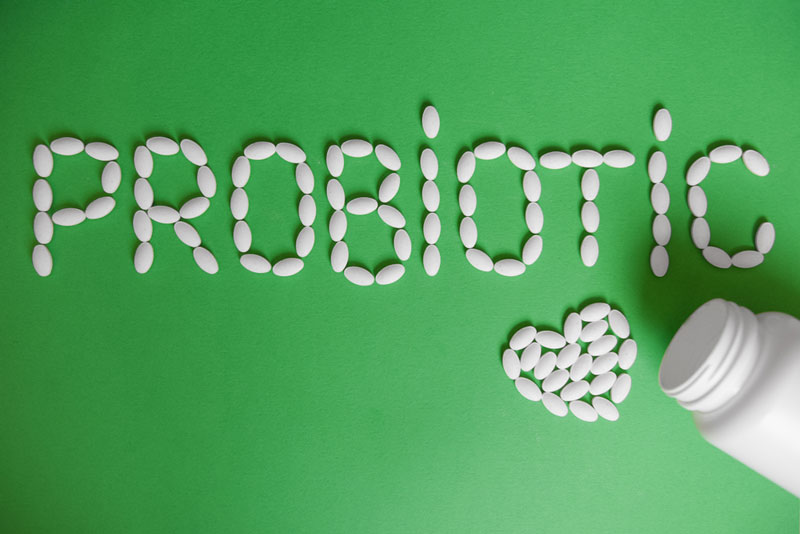
Before you buy probiotics for yourself, keep these points in mind.
Be Choosy
Not all probiotics are created equal. Different strains serve different purposes, so it’s crucial to choose a supplement that aligns with your health needs. For example, while Lactobacillus might be good for diarrhea, Bifidobacterium might be better for constipation.
Read the Label
The label should indicate the probiotic’s genus, species, and strain. The number of organisms that will be alive by the use-by date (often denoted as colony-forming units or CFUs) should also be specified. Choose products that have been third-party tested for quality assurance.
Practice Caution
If you have a compromised immune system or other specific health conditions, it’s essential to consult with a healthcare professional before taking probiotics.
Conclusion
In conclusion, probiotics offer numerous benefits for gut health and overall well-being. However, it’s important to be aware of the possible side effects and consider individual circumstances before incorporating them into your routine. If you have any concerns or medical conditions, consult a healthcare professional who can help guide you toward the most appropriate probiotic regimen.
Frequently Asked Questions
Are All Yogurts Rich in Probiotics?
While many associate yogurt with probiotics, it is vital to select yogurt brands that explicitly mention the presence of “live and active cultures” on their labels. This ensures you’re consuming viable probiotic strains that benefit gut health.
Apart from Yogurt, What Other Foods Can Boost Probiotic Intake?
In addition to yogurt, several fermented foods are rich in probiotics. These include sauerkraut, kimchi, kefir, and kombucha. However, it’s important to remember that not all fermented foods guarantee high levels of active probiotics.

